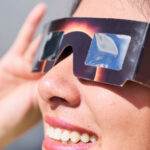For those who wear reading glasses, you’ll understand the frustration of switching frames when moving between various day-to-day tasks, especially at work. Occupational lenses, or ‘computer glasses’, are intended to support office workers and other professionals who require a prescription to see items up close but also view colleagues, computers or other items slightly further away. Rather than persistently putting your glasses on and taking them off, increasing your chances of headaches and eyestrain, occupational lenses provide a more comfortable and consistent way of working.
What Are Occupational Lenses?
Although ‘occupation’ suggests your day job, when it comes to these lenses, it refers to any activity where you need to move your focus from items up close and far away. This could include anything from office work or studying, where you need to switch from reading to typing, to hobbies such as cycling, where you want to check your tracker but also have eyes on the road ahead.
The Different Types of Occupational Lenses
If you think occupational lenses sound like bifocal or varifocal lenses, you’re not far wrong, but they sit somewhere in the middle. Depending on your optical prescription, career and lifestyle, we provide two different types of occupational lenses:
The first enhances your traditional reading glasses; the bottom of the lens holds your long-sighted prescription, which sharpens your vision for reading and close-up activities, whilst the top part of the lens remains clear. Enabling you to easily switch your focus with limited distortion.
The second combines your long-sighted and short-sighted prescriptions, allowing you to seamlessly move your attention from reading a presentation to moving your attention to the speaker in the room. It removes the need for two different glasses, creating one everyday lens.
What’s the Difference Between Occupational Lenses & Varifocals
Although occupational lenses sound similar to bifocal or varifocal lenses, they are different, with their main characteristic being a wider viewing zone. Classic varifocal and bifocal lenses are restricted by their viewing zones, meaning they’re not wide enough to take in the whole picture. They’re also not designed to support reading or computer work for long periods of time, unlike occupational lenses.
With varifocals, because the lens is spilt to hold multiple prescriptions, there’s a limited amount on the lens for intermediate distances, which is required for activities at arm’s reach. That’s why occupational lenses are often referred to as ‘office lenses’ or ‘computer lenses’ because they’re designed to provide more visibility and withstand long periods of these types of office-based tasks.
What Are Occupational Lenses Used For?
Most commonly, occupational lenses are a popular choice for those who are short-sighted, require reading glasses or those suffering from presbyopia. These wearers often require glasses to sharpen their focus on activities close to hand, such as reading, writing or crafts. As you look up from that activity, occupational lenses provide a smooth transition as the top half of the lens remains clear or holds your long-sighted prescription. These are ideal for desk-based jobs, such as teachers marking at their desks while keeping an eye on the students at the back of the class!
What are Occupational lenses made from?
When it comes to the makeup of occupational lenses, they’re no different to any other prescription lens. Especially at Lensology, where we ensure all our lenses are produced from the highest-quality materials. Our expert eyewear technicians will make bespoke occupational lenses which meet your eye prescription, whether that’s a single requirement for reading or multiple requirements for reading and distance.
We can also protect your occupational lenses from general wear-n-tear with additional coatings such as anti-scratch or anti-smudge. As well as protecting your eyesight with blue light protection lenses or high-index lenses for a lighter, thinner and more comfortable lens.
Occupational Lens Features
Occupation lenses boast a huge range of winning features for the wearer, such as:
- Sharper vision for computer screens
- Tailored to your prescription
- Lightweight and comfortable
- Durable
- High-index lenses
Should I be Wearing Occupational Lenses?
If you have myopia and need to wear your prescription glasses daily, occupational lenses could benefit you. There are many professions and activities where you need to focus on the task at hand whilst being able to see the room, road or people in front of you. Some examples include:
- Teachers
- Hairdressers
- IT specialists
- Engineers
- Medical professionals
- Waiters
- Shop Assistants
- Musicians
- Artists
- Writers
- Graphic Designers
- Photographers
If you’re unsure, read our feature blog on whether you should be wearing computer glasses.







